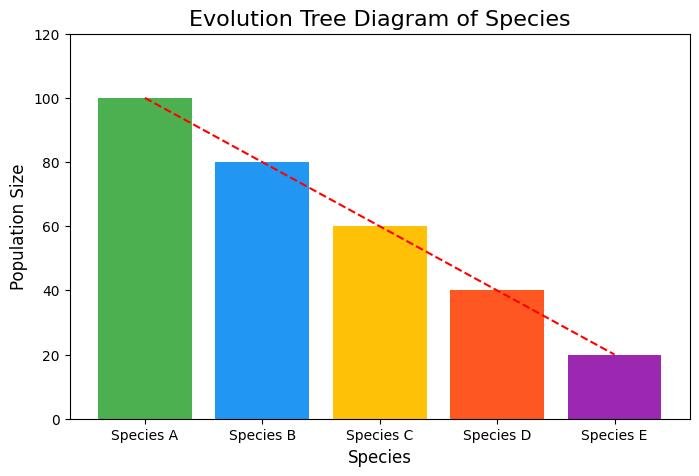Did God Create Man, or Man Create God?
In the age-old debate of creation vs. evolution, a fundamental question arises: Did God create man, or did man create God? This question is not just about theology or science; it is about the very essence of human existence and our place in the universe. It challenges our understanding of history, our beliefs, and the evidence we have painstakingly gathered over centuries. As we delve into this debate, we must consider the complex interplay between faith and reason, myth and fact, and the stories we tell to make sense of our world.
Understanding Creation vs. Evolution
Explore the complexities of the creation vs. evolution debate and understand differing perspectives.
– Learn about the contrasting views on human origins, including the belief in divine creation versus evolutionary science.
– Discover how the Bible aligns or conflicts with scientific theories regarding the age of the Earth, fossils, and human ancestry.
– Examine the implications of these beliefs on morality, religion, and the understanding of the soul in relation to evolution.
The God vs. Science Debate
The God vs. Science debate is not a new phenomenon; it has its roots deep in history, where mythologies and religious beliefs often explained the unexplainable. Science, however, emerged as a tool to decipher these mysteries through empirical evidence and reason. But does science have all the answers, or does it merely raise more questions about our existence?

Consider the story of Galileo, who challenged the church’s geocentric view with his heliocentric theory. His tale is emblematic of the struggle between religious dogma and scientific discovery. Today, we face similar tensions as we explore the cosmos, delve into the minutiae of genetic codes, and ponder the origins of life itself. Are we discovering Gods handiwork, or are we simply unraveling the natural processes that have unfolded over billions of years?
Insider Tip: According to Dr. Neil deGrasse Tyson, “The good thing about science is that it’s true whether or not you believe in it.”
The Evolution vs. Creation Debate
The evolution vs. creation debate is perhaps the most contentious aspect of the God vs. Science discussion. Evolution, as proposed by Charles Darwin in the 19th century, suggests that life on Earth evolved through natural selection. Creationism, on the other hand, holds that life was created by a divine being in its present form.

Statistically, a 2022 Gallup poll found that 40% of Americans believe in strict creationism, while 33% adhere to evolution with divine guidance, and 22% accept evolution without divine intervention. This division reflects a broader societal struggle to reconcile scientific theories with religious beliefs.
Thought-Provoking Question: Can faith and science coexist, or must they always be at odds?
The Bible and Science
Reconciling the Bible with science involves more than reconciling Genesis with geology. It’s about understanding the Bibles role as a historical document, a spiritual guide, and its interpretation in a scientific age. The Bible, with its rich tapestry of narratives, provides insight into ancient perspectives on natural phenomena.

Historically, the Church has sometimes resisted scientific findings, but it has also been a patron of scientific inquiry. The Vatican Observatory is one example of faith and science coexisting. Does this coexistence suggest a broader compatibility between religious texts and scientific inquiry?
The Bible and Evolution
The Bible and evolution are often seen as mutually exclusive, yet some theologians argue for a theistic evolution perspective, where God’s creation unfolds through evolutionary processes. This interpretation seeks to bridge gaps between scripture and scientific evidence.

For instance, the concept of “Genesis kinds” could be metaphorically aligned with evolutionary branches. This interpretation is not universally accepted but offers a pathway for dialogue between science and faith communities.
The Bible and Creation
Creationism is rooted in the narrative of Genesis, where God creates the world in six days. This account has been interpreted literally and metaphorically, sparking much debate. Young Earth Creationists hold a literal view that defies scientific consensus on Earth’s age, while others see the Genesis account as allegorical.

Insider Tip: Dr. Francis Collins, a geneticist and Christian, advocates for a harmonious view where the Bible’s spiritual truths coexist with scientific facts.
The Bible and the Age of the Earth
Determining the Earth’s age involves examining both biblical genealogies and geological evidence. Young Earth Creationists assert an Earth age of approximately 6,000 years, based on biblical timelines. In contrast, radiometric dating provides evidence for an Earth that is about 4.5 billion years old.

The disparity between these views highlights the challenge of reconciling faith-based interpretations with scientific data. Can both perspectives offer valuable insights into our understanding of Earth’s history?
The Bible and the Age of the Universe
The age of the universe, like that of the Earth, is a point of contention. The Big Bang theory suggests a universe approximately 13.8 billion years old, a figure that starkly contrasts with a literal interpretation of biblical creation.

This discrepancy raises questions about the nature of divine revelation and the limits of human understanding. Is the Bible a scientific document, or is it a spiritual text meant to convey deeper truths beyond empirical data?
The Bible and Dinosaurs
Dinosaurs, often absent from biblical narratives, present a fascinating puzzle for creationists. Some young Earth proponents suggest that dinosaurs coexisted with humans, while others argue they are part of the pre-flood world.

Fossil records, however, place dinosaurs millions of years before humans. Could these ancient creatures fit into a broader, perhaps allegorical interpretation of Genesis?
The Bible and Fossils
Fossils, the remnants of life long past, offer a window into Earth’s history. For many scientists, they are evidence of evolutionary processes. For some creationists, they are a record of Noah’s flood or perhaps evidence of a young Earth.

The Bible does not explicitly mention fossils, leaving room for interpretation. Could fossils be seen as a testament to the creative power of God, operating through natural laws?
The Bible and the Flood
The story of Noah’s flood is a cornerstone of biblical narrative and a point of debate between literalists and scientists. Geological evidence suggests localized floods, but a global deluge as described in Genesis lacks support.

The flood narrative raises questions about God’s interaction with creation and the ways in which ancient peoples interpreted catastrophic events. Is the flood story a myth with moral lessons or a historical account?
The Bible and Ice Ages
Ice ages, with their vast environmental shifts, are not mentioned in the Bible. Yet, they have played a crucial role in shaping Earth’s history. Scientists study glacial evidence to understand these periods, while biblical scholars explore potential connections to ancient narratives.

Could the Bible’s silence on ice ages suggest a different focus, one of spiritual rather than scientific revelation?
Thought-Provoking Question: How do we interpret ancient texts in light of modern scientific discoveries?
The Bible and Human Origins
Human origins, as described in Genesis, present a narrative of divine creation, yet anthropological evidence points to a gradual evolution from common ancestors with apes. This dichotomy challenges literal interpretations of scripture.

Some propose that Adam and Eve’s story represents a theological truth rather than a historical account, emphasizing humanity’s unique relationship with the divine. Can such interpretations bridge the gap between faith and anthropology?
The Bible and Race
The Bible’s accounts of humanity’s origins and dispersal, such as the Tower of Babel, have been interpreted in various ways regarding race and ethnicity. Science, however, shows that race is a social construct with little genetic basis.

Understanding race through both a biblical and scientific lens invites questions about identity, unity, and human diversity. How can these perspectives foster a deeper appreciation of our shared humanity?
The Bible and Neanderthals
Neanderthals, our close evolutionary relatives, challenge traditional narratives of human uniqueness. Their existence raises questions about the biblical account of human origins and the nature of the human soul.

Could Neanderthals be part of the “kinds” described in Genesis, or do they represent a separate creation? This inquiry invites reflection on what it means to be human in both a biological and spiritual sense.
The Bible and Apes
The connection between humans and apes, highlighted by genetic similarities, is a linchpin in evolutionary theory. For some creationists, this connection is problematic, as it challenges the notion of human exceptionalism.

Reconciling these views requires a nuanced understanding of the Bible’s teachings and the scientific evidence. Can acknowledging our biological heritage enhance our appreciation of the divine image in humanity?
The Bible and the Soul
The concept of the soul is central to many religious beliefs, offering a dimension beyond physical existence. Science, however, does not address the soul, focusing instead on the material aspects of life.

This dichotomy invites exploration of what it means to be humanwhether our essence is purely biological or intrinsically spiritual. How do we define the soul in an age dominated by scientific inquiry?
The Bible and Morality
Morality, often grounded in religious teachings, is sometimes seen as at odds with a scientific worldview. Yet, many argue that moral frameworks can exist independently of religious doctrine, informed by empathy and reason.

The Bible provides a rich source of moral guidance, but its teachings must be interpreted in the context of contemporary ethical challenges. Can science and religion collaborate to address moral dilemmas in our complex world?
The Bible and Religion
Religion, with its rituals, narratives, and communities, offers a framework for understanding life’s mysteries. Science, with its evidence-based approach, seeks to explain the mechanics of the universe.

The interplay between religion and science enriches our understanding of the world, inviting dialogue and mutual respect. How can we foster a world where both perspectives are valued and integrated?
Conclusion:
In the profound debate of God vs. Science, we are reminded that understanding our origins and purpose is not merely about choosing sides. It is about seeking truth through diverse lensesembracing the wisdom of ancient texts and the insights of modern science. As we navigate this complex terrain, we are challenged to question our assumptions, broaden our perspectives, and find common ground in our shared quest for meaning.
Questions & Answers
What is the main argument in the creation vs. evolution debate?
The main argument centers on whether God created humanity or if evolution explains human existence.
Who are the key figures in the creation vs. evolution debate?
Key figures include scientists like Charles Darwin and theologians like William Lane Craig.
How do creationists view the origin of humanity?
Creationists believe that a divine being directly created humans in their current form.
What do evolutionists argue about the development of humans?
Evolutionists argue that humans evolved over millions of years through natural selection.
Why do some people reject evolution in favor of creationism?
Some reject evolution due to religious beliefs, feeling it contradicts their faith.
How can I reconcile my faith with the theory of evolution?
Many find harmony by viewing evolution as a tool used by God for creation.



